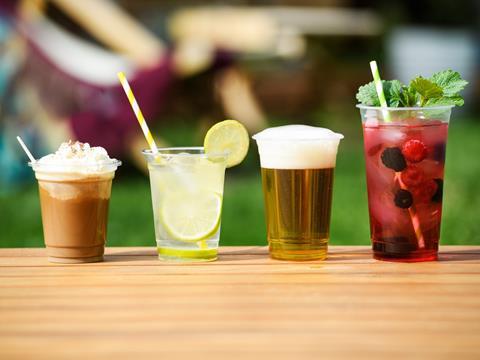
Kiefel has launched its new tilting machine, SPEEDFORMER KTR 6.2 SPEED, for the mass production of polymer cups and coffee capsules, said to offer up to 50% higher output at the same footprint and quality compared to other machine manufacturers.
The technology solution reportedly provides higher productivity and production versatility while offering 10% energy savings due to optimized heating. The new SPEEDFORMER KTR 6.2 is designed for large-scale production of high-end thermoformed polymer cups.
Kiefel says the KTR 6.2 has a powerful drive system at the Trim-in-place station with a punching force of 900 kN, apparently allowing the machine to punch a variety of materials including thicker films, such as PET. The company states the machine technology is also enhanced to produce higher cups up to 250 mm.
The machine aims to deliver higher production speed for customers with two modules: the optimized and integrated SPEEDSTACKER which can handle a greater number of products and a wider range of geometries, and the new downstream automation CUPPACKER for cup packaging, which can be optionally integrated into the KTR 6.2.
Kiefel adds that both modules offer optimized product transfer that uses real-time monitoring to guarantee maximum speed and output and smooth machine movements.
“The KTR 6.2 includes a new intuitive user interface, KMI 2.0, which facilitates thermoforming processes, supporting customers from a short training period and fast recipe optimization to efficient error handling and a targeted maintenance system,” says Alexander Donabauer, director sales of the Polymer Packaging Division at Kiefel.
In related news, Ahlstrom has released its fibre-based lid for single-serve coffee capsules, which it says is certified compostable in home and industrial conditions and aims to replace plastic and aluminium alternatives. Its oxygen barrier is intended to preserve the flavour and freshness of the coffee, while its built-in filter is designed to retain dust and maintain the purity of the coffee.
Somater and Eranova collaborated to produce biobased packaging derived from green algae, aiming to replace fossil-based polymers with an environmentally conscious alternative. It is hoped that algae cultivation and upcycling will have a positive environmental impact, as it could also help to prevent pollution in nature and on the coast.
If you liked this story, you might also enjoy:
How are the top brands progressing on packaging sustainability?
Sustainable Innovation Report 2024: Current trends and future priorities
Reuse vs. single use – which is better for the environment?
The ultimate guide to global plastic sustainability regulation














No comments yet